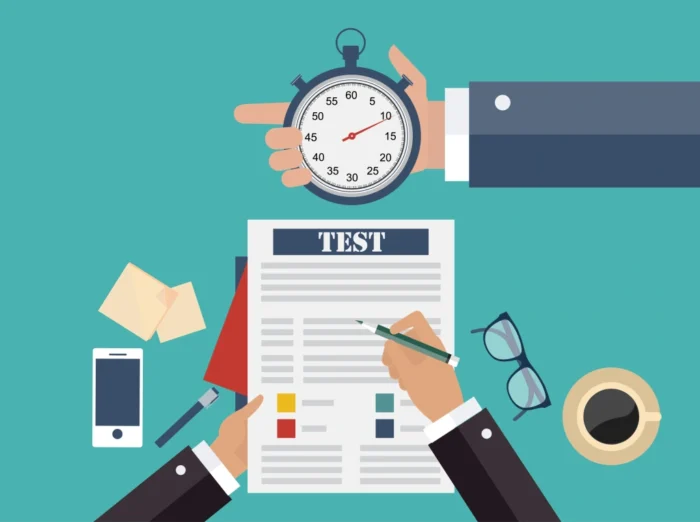
A person’s intrinsic qualities, cognitive powers, problem-solving ability, and critical thinking are assessed on these tests. An individual’s chances of excelling in various sectors may be determined by taking an aptitude test, which is used to achieve a number of goals in a range of situations. The relevance of aptitude tests in numerous disciplines will be highlighted as this essay examines their significance and aims.
Importance of Aptitude Tests

Identifying Natural Abilities:
Aptitude tests are instrumental in identifying an individual’s natural abilities and talents. They evaluate cognitive aptitudes that are relatively stable and not easily influenced by external factors. By understanding one’s natural abilities, individuals can make informed decisions about career paths, educational choices, and personal development.
Objective Assessment:
Aptitude tests provide an objective and standardised means of evaluation. They measure specific aptitudes using predetermined criteria and scoring systems, minimising biases and subjective judgments. This objectivity ensures fairness and equal opportunities for all test-takers, regardless of their backgrounds or personal characteristics.
Enhancing Diversity and Inclusion:
Aptitude tests promote diversity and inclusion by providing a fair and objective evaluation process. They remove biases associated with factors like gender, race, or socioeconomic background, allowing organisations and educational institutions to identify and select candidates based solely on their demonstrated aptitudes. This helps create a level playing field for all individuals, fostering a diverse and inclusive environment.
Purpose of Aptitude Tests

Educational Admissions:
The use of aptitude tests in admissions to higher education is common to determine a student’s fit for a certain degree or course. These assessments identify children who are likely to excel in demanding academic situations by evaluating aptitudes including verbal reasoning, critical thinking, and numerical reasoning.
Career Guidance and Counseling:
Aptitude tests assist individuals in career exploration and decision-making. These tests provide insights into one’s aptitudes, helping individuals identify career paths that align with their strengths and interests. Career guidance professionals can use aptitude test results to provide personalized advice and recommendations for career development.
Training and Development:
Aptitude tests aid in designing personalized training and development programs. By identifying individuals’ aptitude strengths and weaknesses, organizations can customize training interventions to enhance specific aptitudes and address areas for improvement. This targeted approach improves the effectiveness of training initiatives and promotes individual growth and development.
Succession Planning:
Aptitude tests play a crucial role in succession planning within organizations. These tests assess individuals’ potential to assume higher-level roles and responsibilities based on their cognitive abilities and problem-solving skills. Succession planning facilitated by aptitude tests ensures a smooth transition of key positions and identifies high-potential employees for leadership development.
Research and Validity Studies:
Aptitude tests are extensively used in research and validity studies to examine the relationship between specific aptitudes and performance in various domains. By establishing the validity of aptitude tests, researchers can further enhance the predictive accuracy and reliability of these assessments.
Aptitude Tests

Verbal Reasoning:
Verbal reasoning tests evaluate a person’s ability to understand and analyze written information. These tests assess skills such as comprehension, vocabulary, and logical reasoning.
Spatial Reasoning:
Spatial reasoning tests evaluate a person’s ability to manipulate and understand visual information in three-dimensional space. These tests assess skills in mental rotation, visualization, and spatial perception.
Mechanical Reasoning:
Mechanical reasoning tests measure an individual’s understanding of mechanical concepts and principles. They assess aptitudes related to mechanical reasoning, such as understanding simple machines, gears, and mechanical processes.
Occupational Fit:
Aptitude tests are useful in assessing an individual’s compatibility with specific occupations or job roles. Different occupations require different sets of aptitudes. Employers can assess a candidate’s aptitude profile to evaluate how likely it is that they would succeed in and enjoy a given position. By placing people in careers that match their interests and natural talents, this promotes job happiness and productivity.
Skill Gap Analysis:
Aptitude tests can also be used to identify skill gaps within an organization. By assessing the aptitudes of existing employees, organizations can identify areas where additional training or development is needed. This analysis helps in designing targeted training programs and interventions to bridge the skill gaps and improve overall performance within the workforce.

Benchmarking and Standardization:
A baseline for comparing individuals to a uniform set of requirements is provided by aptitude testing. Organizations can use objective data to make decisions by comparing applicants’ or workers’ performance to a set benchmark. The evaluation procedure is uniform and fair because of this standardization.
Enhancing Recruitment and Selection Efficiency:
By offering a valid and consistent way for assessing individuals, aptitude tests expedite the hiring and selection process. Both recruiters and candidates may save time and resources by using these tests to quickly weed out unqualified applicants. Organisations can pick the best individuals for further consideration and interviews by evaluating aptitudes pertinent to the job description.
Validating Educational Programs:
Tests of aptitude are used to validate educational initiatives. Institutions can assess the effectiveness of their educational interventions and make the required adjustments to improve the program’s results by comparing students’ aptitudes before and after a program.
Tailoring Learning Experiences:
Aptitude tests provide valuable information for tailoring learning experiences to individual needs. By understanding students’ aptitudes, educators can design personalized learning plans, interventions, and teaching strategies that cater to their strengths and weaknesses. This customised approach enhances student engagement, learning outcomes, and overall academic performance.

Continuous Improvement:
Aptitude tests contribute to continuous improvement in selection processes, educational programs, and organizational practices. By analyzing the results and outcomes of aptitude testing, organizations and institutions can identify areas for improvement, refine their assessment methods, and enhance decision-making processes.









